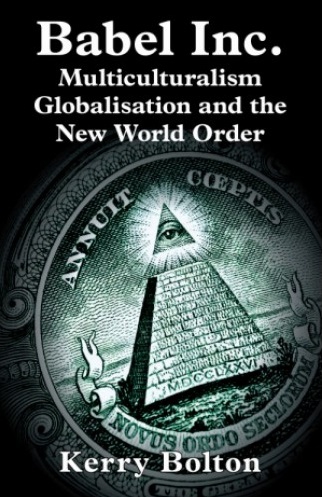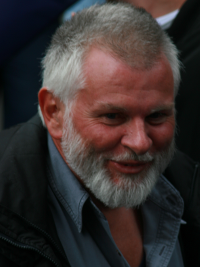samedi, 07 mars 2015
Babel and the Capitalist Babelization
Babel and the Capitalist Babelization
Tom Sunic
Review of Babel Inc.: Multiculturalism, Globalisation, and the New World Order
by Dr. Kerry Bolton
Black House Publishing Ltd, 2013
 The tower of Babel is rightly used as a metaphor for contemporary rootless and mongrelized masses stashed together in the towering inferno of end times. As an allegory, however, the process of “babelization” signifies a distorted reality and an inhumane political process in which standard forms of cognition and speech are subject to entirely new denominations, requiring a completely different method of conceptualization. Attempting, therefore, to draw some parallels between George Orwell’s 1984 and Bolton’s Babel Inc., cannot be valid; Orwell’s vision of the static future has become outdated. Bolton’s Babel Inc. offers, instead, a dynamic description of the process of capitalist entropy in which Babel Inc. and its ruling class continue to grind human beings, including themselves, to dust.
The tower of Babel is rightly used as a metaphor for contemporary rootless and mongrelized masses stashed together in the towering inferno of end times. As an allegory, however, the process of “babelization” signifies a distorted reality and an inhumane political process in which standard forms of cognition and speech are subject to entirely new denominations, requiring a completely different method of conceptualization. Attempting, therefore, to draw some parallels between George Orwell’s 1984 and Bolton’s Babel Inc., cannot be valid; Orwell’s vision of the static future has become outdated. Bolton’s Babel Inc. offers, instead, a dynamic description of the process of capitalist entropy in which Babel Inc. and its ruling class continue to grind human beings, including themselves, to dust.
Which are these ruling classes in this Babel Inc.? This is where the author masterfully steps in and rejects the wide-spread right-wing babble about the Babel Inc. being allegedly run by a conspiratorial and homogenous group of wicked people, or some extra-terrestrial golems allegedly bent on ruling the White world. Rather, the Babel Inc., or simply put, the System, resembles a nameless, albeit grotesque polity that can in no way be reduced to just one single free-lance Orwellian big brother or some big postmenopausal feminist mama. The Babel Inc., as Bolton sees it, is a logical postmodern transposition of the myth of economism and egalitarianism, two doctrines whose genealogy can be traced from well before the period of Enlightenment in Europe.
Twin Brothers: Communism and Capitalism
This does not mean at all that Bolton avoids elucidating the mindset and the self-perception of the main movers and shakers in the Babel Inc. In fact, Bolton’s scholarly credibility can best be spotted through the wealth of bibliographic references which indicate the intellectual depth of this effort. Bolton uses a three- pronged approach: theoretical, historical and descriptive. Such a threefold approach to this heavy subject is a prime necessity if the book is to retain a lasting educational value. Thus we learn in the first half of his book that capitalism, being a prime factor in the construction of the modern Babel Inc. and in the deconstruction of the nation-state, has always been a “modern and revolutionary” force. Its inherent dynamics aims at destroying traditional communities, regardless of their spot on the planet Earth. In fact, the much decried and alleged foe of capitalism (or rather its mirror- image), communism, fell apart in the East, in the late 20th century, because its paleo-communistic goals of egalitarianism and economism had already been better achieved in the capitalist West. Both communism and capitalism share a common ideological thread, namely a common belief in progress and common hatred of all racial, ethnic and territorial identities. The Banker and the Merchant, just like their mirror-image the Commissar, detect in any historical rootedness, in any national or racial consciousness a major hindrance on the way to the glorious future under the banner of “free market, democracy and human rights”.
Photo: Kerry Bolton
 On the daily political front, however, or better yet within the historical context of the development of the Babel Inc., Bolton does not spare the names of organizations and individuals promoting the borderless and globalist Babel Inc. project; knowledge of these forces can help the uninitiated reader dispel the myth of a “freedom- loving West” and its main transmission belt the United States of America. In fact, as Werner Sombart, the German sociologist of the early 20th century noted, “Holy Economy” (“heilige Wirtschaftlichkeit”) is a far more powerful revolutionary process than any anarchistic get together or a communist rabble-rousing pamphlet.
On the daily political front, however, or better yet within the historical context of the development of the Babel Inc., Bolton does not spare the names of organizations and individuals promoting the borderless and globalist Babel Inc. project; knowledge of these forces can help the uninitiated reader dispel the myth of a “freedom- loving West” and its main transmission belt the United States of America. In fact, as Werner Sombart, the German sociologist of the early 20th century noted, “Holy Economy” (“heilige Wirtschaftlichkeit”) is a far more powerful revolutionary process than any anarchistic get together or a communist rabble-rousing pamphlet.
The author starts with his home turf with an examination of the early Australian working class, which under the banner of the Labor Party, as early as the 19th century, was bit by bit defrauded by the bankers and speculators who were all too eager to open Australia to Asian migrants and thus drive down the wages of white local workers. The loudest advocates, and later on the beneficiaries of the process of the so-called decolonisation in Asia and Africa, were not just Marxist professors in Western academe, or Soviet Cold War apparatchiks, but primarily international big businessmen, “as old empires had become too restive to capitalism.” The author well illustrates this point by looking at the tragic fate of South Africa and Rhodesia, once upon a time White-ruled countries which used to be the bread basket of Africa, only to turn into violence-torn African basket cases with no future in sight. The iconic figure of the ANC, the Black activist Nelson Mandela, still hailed by starry-eyed globalists as the canonized Black Saint, once upon a time was determined to kick capitalism out of South Africa, only to declare in 1996, that is to say, after South Africa had already turned into an ungovernable entity, that “privatisation is the fundamental policy of the African Nation Congress and will remain so.”
The American government, The Trilateral Commission, along with many self-proclaimed humanitarian NGOs, such as the famed George Soros’ Open Society Institute, behind their mask of lacrimal multiculturalism and behind their culinary diplomacy, have been the main motors in turning Asia and Africa into a giant pool of cheap labor and permanent political unrest. This is the true goal of Babel Incorporated. Hence the first conclusion one can draw after completing reading the first half of the book, and just before one starts railing and ranting against colored immigrants flooding now Europe and the USA: Massive non-White immigration, and now its reverse side, i.e. the colonisation of Europe and the USA, is just a logical outcome of political designs framed long time ago by rootless plutocrats and their leftist acolytes.
Bolton does not forget to look at the importance of “culture wars” and notes how global plutocrats use those wars in an attempt to subvert recalcitrant governments all over the word. Contrary to false presumptions, still strongly held by many right-wing intellectuals, the “uncultured” USA plutocrats have been very slick in fostering the multicultural “American dream” by resorting beforehand to the creation of a myriad of “independent” cultural outlets and think tanks in the target countries. One could enumerate a dozen post-communist countries in Eastern Europe which, in the mid- 90’s and early 2000’s, were all subjected to the Babel Inc.-inspired “velvet” and “rainbow” revolutions, as well as the so- called “Arab spring revolutions.” In an attempt to destroy a sense of national and racial pride and in an effort to impose a hybrid mishmash of new consumer species — i.e., homo consumens — the Babel Inc. decision makers do not need to send F14s to the Serbian skies or over the Iraqi desert, but instead resort first to Hollywood imagery and hip-hop political acrobatics in order to enchant the youth of the target country. The costs are negligible; the benefits are great.
The author rightly sees that before Whites start bewailing the destructive consequences of forced multiculturalism and its inevitable corollary of non-White immigration flooding their countries, they must critically re-examine the now redundant notion of their own nation-state. It is fundamentally wrong to blame all our ills on the SPLC, or the ADL, or the LICRA, or the Trilateral Commission, or some real or hypothetical Jew, or some hostile, plutocratic, culture-destroying Babel Inc. elites only. We White Europeans and Americans must accept our full share of the blame. We must first and foremost reject the religion of progress and its underlying principle of permanent economic growth, before considering setting up our own ethnic enclaves. Whether these ethnic enclaves are in the Northwest of the U.S., or in Orania in South Africa, or somewhere in Europe, they must keep capitalism on a short leash aimed at preserving the racial/ethnic integrity of these enclaves, as occurred under the White Australia policy and the 1924 immigration restriction law in the U.S. Given the still strong and age-old squabbles among and amidst European peoples, this nearly impossible task can only be bestowed upon dispassionate White individuals capable of transcending their own narrow tribal interests — and their own egos.
Dr. Tom Sunic (www.tomsunic.com) is a writer and a board member of the American Freedom Party.
00:05 Publié dans Livre, Livre, Nouvelle Droite | Lien permanent | Commentaires (0) | Tags : tomislav sunic, kerry bolton, babel, babelisation, livre, nouvelle droite |  |
|  del.icio.us |
del.icio.us |  |
|  Digg |
Digg | ![]() Facebook
Facebook


